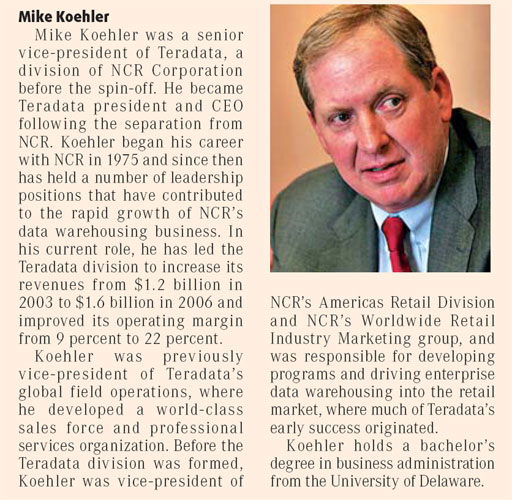

Sitting in front of Chinese reporters during a news conference in a five-star hotel in Beijing in late May, Teradata President and CEO Mike Koehler had mixed feelings about describing his company's development after it spun off from NCR Corp six months before.
Koehler told the media that the 8th China-based users conference for Teradata was now taking place in Beijing, where the company's first such meeting was also held eight years before. Now it was returning to the starting point. Teradata is a hardware and software vendor specializing in data warehousing and analytic applications.
"Our long-term target is to see a 7-9 percent growth in our revenue," Koehler says, though the president knows there is still a tough road ahead.
The NYSE-listed data warehousing company reported revenues of $375 million for the first quarter of 2008, a mere 2 percent increase from the same period of last year.
Teradata's first-quarter net income was $42 million, or $0.23 per diluted share, which compared to $43 million, or $0.24 per diluted share, in the first quarter of 2007. As expected, Teradata's first quarter results included $11 million of incremental costs associated with Teradata now operating as an independent publicly-traded company, Teradata said in its 2008 First Quarter Results recently.
"We want to be a key market player," Koehler says, whose company plans to strengthen its foothold in China with its 25 business clients at present and maybe more in the future.
Teradata was spun off from NCR Corporation last October. It has more than 5,500 associates in over 40 countries and a client base of over 850 corporate customers worldwide.
The business gross margin was lower in the first quarter of 2008 primarily due to unexpected business performances in the United States, the company says.
"We continue to see that the overall global demand for enterprise data warehousing remains strong, as companies look to Teradata to achieve competitive advantage with our data warehousing solutions," says Koehler. "While we are disappointed with our start to the year, primarily due to lengthening sales cycles in the United States, the fundamentals of our business remain solid and we are maintaining our guidance for 2008," says Koehler.
Six months after the spin off from NCR, the significant change is that Teradata now controls its own investment and it is planning to invest in more adjacent businesses instead of solely relying on its data warehousing solutions, he says.
Koehler began his career with NCR more than 30 years ago and since then has held a number of leadership positions that have contributed to the rapid growth of NCR's data warehousing business. But now perhaps his primary concern is how every coin of his company is spent and keeping an optimistic balance sheet for his shareholders.
"We are investing for growth," he says.
In China, Teradata is looking for potential opportunities in the consulting services industry, and is poised to invest in projects with partners and acquisition opportunities.
The company's three major marketplaces now include North America and Latin America (Americas); Europe, Middle East and Africa (EMEA); and Asia Pacific / Japan (APJ). Although Koehler did not quantify its business in China, the company's report of third quarter results shows that Teradata generated $62 million in revenues in its APJ region, including the China market, in the first quarter of 2008, the same as the corresponding period in 2007. The year-on-year revenue comparison in the APJ region benefited from 9 percentage points due to currency conversions.
Revenue in Teradata's EMEA region in the first quarter of 2008 was $103 million, up 14 percent from $90 million generated in the first quarter of 2007. Currency conversion benefited revenue growth in the EMEA region by 11 percentage points.
Teradata is closely studying China's healthcare reform and the manufacturers' development as it believes those sectors represent large business opportunities.
However, due to the yuan appreciation, a slump in exports, rising inflation and natural disasters quite a few Chinese companies and the government departments alike are tightening their financial belts and leaving an uncertain future for Teradata in China.

(China Daily 06/09/2008 page6)













